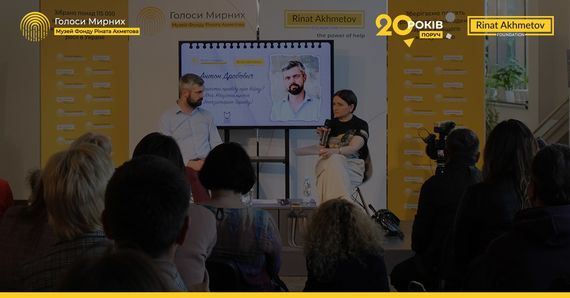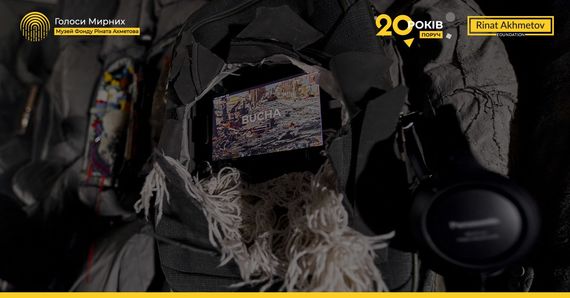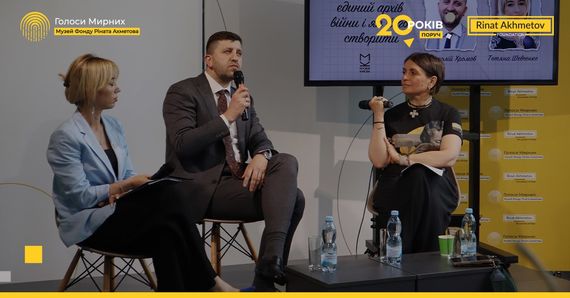The Museum of Civilian Voices of the Rinat Akhmetov Foundation: the stories from Azovstal

The Museum of Civilian Voices of the Rinat Akhmetov Foundation is the world’s largest archive of accounts from civilians who suffered from Russia’s war against Ukraine. The mission of the Museum is to collect, file, categorize and share the stories of Ukraine’s civilians for a better understanding of life during the war for the purpose of creating a better future.
The Museum aims to сreate a reliable source of information about the life of Civilians during the war told in the first person with the objective of providing a unique psychotherapeutic project that will contribute to the psychological well-being and mental health of Ukrainians traumatized by the war, through the sharing of their stories.
The Rinat Akhmetov Foundation is Ukraine's biggest private charity. From the first days of the war in 2014, the humanitarian aid provided by the Foundation helped to save 3.5 million people from Donbass. Thousands of those people shared their stories with the Foundation, so they were put together as a unique online museum.
Since the beginning of Russia’s full-scale invasion of Ukraine in 2022, the Museum has become an archive of the tragedies of all the Ukrainian people.
The stories from Azovstal
The enemy is attacking all of Ukraine. What the country is experiencing today is a common tragedy for all its people. But there are regions, cities and hotspots that have been hit harder by the war. One such hotspot is the Azovstal plant in Mariupol. The fate of Mariupol shocked the whole world and Azovstal has become a symbol of the strength and steadfastness of the Ukrainian people, and their readiness to fight for their freedom.
The archive of the Museum of Civilian Voices of the Rinat Akhmetov Foundation shares stories of Mariupol residents who survived all the horrors of the war during their stay at Azovstal.
For example, the story of Serhiy Kuzmenko, who survived large-scale shelling while hiding in the bomb shelter of the Azovstal plant. The premises were damp, everything including food was covered with mould, and the wounded people rotted alive. The only thing he dreamed of was to get out of the shelter with his family and reach peaceful Ukrainian territory. But after two months of shelling there was not a day of silence. Only at the beginning of May was it possible to evacuate. Serhiy had to go through the so-called filtration, and finally, he and his family were able to get to Zaporizhia. You can see and listen to his story here https://bit.ly/3t6F5Ql
Oleksandr Shabanov from Mariupol survived in the Azovstal shelter. There were 70 people there, including 18 children aged 3 months and older. There were refrigerating chambers in the shelter, thanks to which food was preserved. The diesel generator was running. The stock of water in the workshops was large. There was even a shower. But shells flew overhead, and the shelling intensified. It was not possible to leave the plant. Three weeks were very difficult: people were waiting for evacuation, and they experienced panic attacks. Both exits were blocked. Finally, people got out through a hole in the wall. Oleksandr's story can be found at https://bit.ly/3PITlIy
“We thought that it would all end quickly, but it didn’t happen,” Inna Slitko, a resident of Mariupol, says about the start of hostilities in her hometown. Before the war, she and her husband worked at Azovstal, and the war found them at work. Inna took her three children and pets to the shelter. They were stuck at Azovstal for a whole month, and it would have been very difficult to survive without the help of the Azov fighters. On March 26, they left the factory on foot, and in 6 hours, dashing under shelling, got out of the city. Finally, they were evacuated to Zaporizhia. Inna shared her story with the Museum of Civilian Voices. Listen at https://bit.ly/3wYCUk2
The archive of the Museum of Civilian Voices of the Rinat Akhmetov Foundation already numbers more than 15,000 first-hand testaments — vivid, real-life and unique. The Rinat Akhmetov Foundation’s staff members and volunteers continue to communicate with people and record their stories.
To share a story, everyone can visit the Museum’s portal and click on the “Tell a story” button in the top right corner of the main page. There are options: to share a story online now, to send a telephone number, to share the story directly, or to send it via email. Another option is to call the toll-free hotline 0 (800) 509 001 in Ukraine.
Originally published on the EU Reporter web-site.



